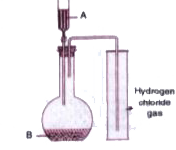In the laboratory preparation of hydrogen, pure zinc is not used because
Step-by-Step Solution:
1. Understanding the Reaction: In the laboratory, hydrogen gas can be prepared by reacting zinc with dilute sulfuric acid. The chemical reaction can be represented as:
Zn+H2SO4→ZnSO4+H2↑
2. Role of Pure Zinc: Pure zinc is a reactive metal that readily reacts with acids to produce hydrogen gas. However, when pure zinc is used, it can lead to the formation of a passive layer.
3. Formation of Passive Layer: When zinc reacts with sulfuric acid, hydrogen gas is produced. However, this reaction can cause the formation of a passive layer of zinc sulfate on the surface of the zinc. This layer acts as a barrier.
4. Effect of the Passive Layer: The passive layer formed on the zinc surface inhibits further reaction between the zinc and the sulfuric acid. As a result, the rate of hydrogen gas production decreases significantly, and the reaction may eventually stop.
5. Conclusion: Therefore, pure zinc is not used in the laboratory preparation of hydrogen because the passive layer formed during the reaction prevents further reaction with the acid, thus reducing the efficiency of hydrogen production.
---
Zn+H2SO4→ZnSO4+H2↑
Similar Questions
Select the correct answer from the choice in bracket to complete each sentence:
The acid__________[dil.H2SO4,dil.HNO3,dilHCl] is not used in the laboratory preparation of hydrogen, using zinc and an acid.
View SolutionGive reason for the following:
In the laboratory preparation of hydroge from zinc and dilute hydrochloric acid- the zinc used is granulated zinc.
View SolutionWrite the balanced chemical equation for the laboratory preparation of hydrogen chloride gas.
View SolutionAcid used in the laboratory for preparation of hydrogen.
View SolutionWhy the apparatus used for the laboratory preparation of hydrogen chloride should be perfectly dry ?
View SolutionState the salt and acid , used in the laboratory preparation of hydrogen chloride.
Give the equation for the preparation .
View Solution(i) Write the equation for the laboratory preparation of hydrogen.
(ii) How is the gas collected?
(iii) Write the confirmatory test for Hydrogen.
View SolutionThe following questions are pertaining to the laboratory preparation of hydrogen chloride gas :
State a safety precaution you would take during the preparation of hydrochloric acid.
View SolutionThe following questions are pertaining to the laboratory preparation of hydrogen chloride gas:
How would you check whether or not the gas jar is filled with hydrogen chloride?
View SolutionThe diagram shows an apparatus for the laboratory preparation of hydrogen chloride.

Write the equation for the reaction.
View Solution
